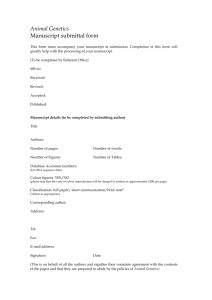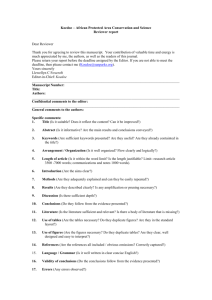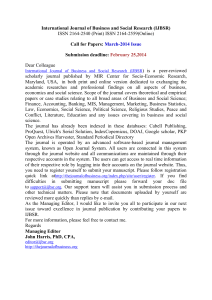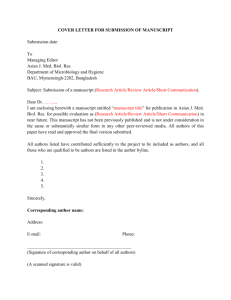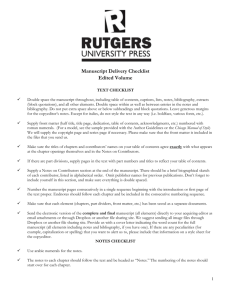downloaded here. - Human Development and Capability Association
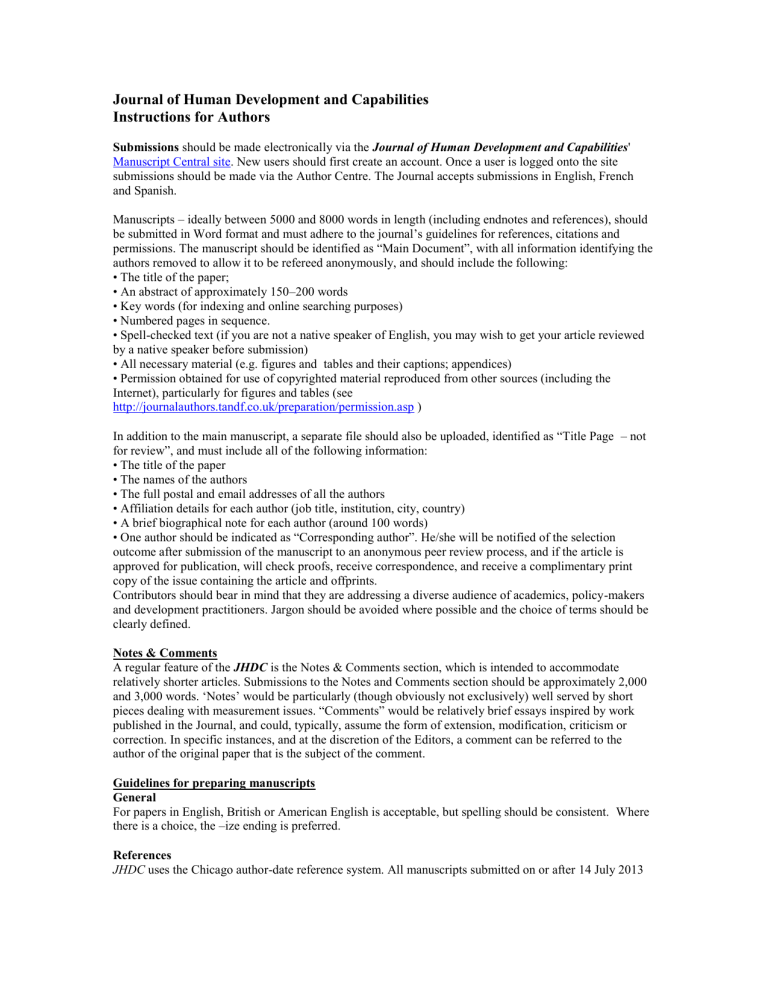
Journal of Human Development and Capabilities
Instructions for Authors
Submissions should be made electronically via the Journal of Human Development and Capabilities '
Manuscript Central site . New users should first create an account. Once a user is logged onto the site submissions should be made via the Author Centre. The Journal accepts submissions in English, French and Spanish.
Manuscripts – ideally between 5000 and 8000 words in length (including endnotes and references), should be submitted in Word format and must adhere to the journal’s guidelines for references, citations and permissions. The manuscript should be identified as “Main Document”, with all information identifying the authors removed to allow it to be refereed anonymously, and should include the following:
• The title of the paper;
• An abstract of approximately 150–200 words
• Key words (for indexing and online searching purposes)
• Numbered pages in sequence.
• Spell-checked text (if you are not a native speaker of English, you may wish to get your article reviewed by a native speaker before submission)
• All necessary material (e.g. figures and tables and their captions; appendices)
• Permission obtained for use of copyrighted material reproduced from other sources (including the
Internet), particularly for figures and tables (see http://journalauthors.tandf.co.uk/preparation/permission.asp
)
In addition to the main manuscript, a separate file should also be uploaded, identified as “Title Page – not for review”, and must include all of the following information:
• The title of the paper
• The names of the authors
• The full postal and email addresses of all the authors
• Affiliation details for each author (job title, institution, city, country)
• A brief biographical note for each author (around 100 words)
• One author should be indicated as “Corresponding author”. He/she will be notified of the selection outcome after submission of the manuscript to an anonymous peer review process, and if the article is approved for publication, will check proofs, receive correspondence, and receive a complimentary print copy of the issue containing the article and offprints.
Contributors should bear in mind that they are addressing a diverse audience of academics, policy-makers and development practitioners. Jargon should be avoided where possible and the choice of terms should be clearly defined.
Notes & Comments
A regular feature of the JHDC is the Notes & Comments section, which is intended to accommodate relatively shorter articles. Submissions to the Notes and Comments section should be approximately 2,000 and 3,000 words. ‘Notes’ would be particularly (though obviously not exclusively) well served by short pieces dealing with measurement issues. “Comments” would be relatively brief essays inspired by work published in the Journal, and could, typically, assume the form of extension, modification, criticism or correction. In specific instances, and at the discretion of the Editors, a comment can be referred to the author of the original paper that is the subject of the comment.
Guidelines for preparing manuscripts
General
For papers in English, British or American English is acceptable, but spelling should be consistent. Where there is a choice, the –ize ending is preferred.
References
JHDC uses the Chicago author-date reference system. All manuscripts submitted on or after 14 July 2013
must be formatted with references in this style. If you have any queries and require advice or information, please contact the journal’s
Production Editor or Managing Editor
• Full bibliographic detail must be included for each item in your References list, and all references must be in correct format for the journal (please refer to the Chicago author-date guide for details). Numerical references are not acceptable.
• All items in your References list must be cited (indicated) in your text, and vice versa.
Figures and Tables
• All tables and figures must be supplied, identified by an Arabic numeral, and cited within the text (for example “(see Figure 1)”; “Table 2 shows….”.
• Tables, figures, and captions should be separated from the body of the text, their approximate position should be indicated in the manuscript.
• Figure graphics must be in highest possible resolution. Figure graphics must be viewable in black-andwhite format if your article is not printing in colour (for further information please visit http://journalauthors.tandf.co.uk/preparation/artwork.asp
).
• Captions for all tables and figures captions must be provided.
PLEASE NOTE: Authors should restrict their use of colour in Figures to situations where it is absolutely necessary on scientific, and not merely cosmetic, grounds. Colour figures will be reproduced in colour in the online edition of the journal free of charge. If it is necessary for the figures to be reproduced in colour in the print version, a charge will apply. Charges for colour pages are £250 per figure ($395 US Dollars;
$385 Australian Dollars; 315 Euros). If you wish to have more than 4 colour figures, figures 5 and above will be charged at £50 per figure ($80 US Dollars; $75 Australian Dollars; 63 Euros). Please consult the
Production Editor if you require further information.
Endnotes
Explanatory notes should be kept to a minimum. They should be indicated in the text with a superscript number and grouped as endnotes, after the text, and before the reference list.
Guidelines for book reviews
Book Review Editor: David A. Clark
The Journal of Human Development and Capabilities is seeking book reviewers and books to review on the perspectives and challenges of human development, capability expansion and poverty eradication. The book review section is evenly split between theory and policy with each issue aiming to publish up to six book reviews.
Style
• Book reviews should not normally exceed 800 words.
• Footnotes, endnotes, sub-headings and references should be avoided.
The review should be preceded by the full bibliographical details of the book under review including the name(s) of the book’s author(s), date of publication, title of the book, publisher, place of publication and
ISBN code. The name(s) and institutional affiliation of the book review author(s) should appear at the end of the review.
Review Articles
Longer review articles (of up to 8,000 words) will also be considered for publication at the discretion of the editors. These articles may focus on specific themes, review multiple books simultaneously and/or include commentary and analysis that goes beyond standard book reviews. Such articles will be treated as regular paper submissions and should be prepared in accordance with the notes for contributors (set out in
Guidelines for preparing manuscripts , above) and follow house style.
Submission
Book reviews should be sent in electronic format to the Managing Editor, Kathy Rosenblum. Email: managingeditor@hd-ca.org
Publishers who wish to send books or bound galley proofs should contact the Book Review Editor: David
Clark, email: david_a_clark@hotmail.com
Review articles should be submitted via the online submission process. Click here
It is advisable to contact the Administrative Editor before undertaking a review, as the Journal often commissions reviews of key books. In some cases, the Journal may be able to provide a complimentary copy of the book under review.
View more information about the JHDC on the Human Development and Capability Association webpage, http://www.capabilityapproach.com/index.php
Reproduction of copyright material: As an author, you are required to secure permission to reproduce any proprietary text, illustration, table, or other material, including data, audio, video, film stills, and screenshots, and any supplemental material you propose to submit. This applies to direct reproduction as well as “derivative reproduction” (where you have created a new figure or table which derives substantially from a copyrighted source). The reproduction of short extracts of text, excluding poetry and song lyrics, for the purposes of criticism may be possible without formal permission on the basis that the quotation is reproduced accurately and full attribution is given. For further information and FAQs, please see
http://journalauthors.tandf.co.uk/permissions/usingThirdPartyMaterial.asphttp:// journalauthors.tandf.co.uk/permissions/usingThirdPartyMaterial.asp
http://journalautho rs.tandf.co.uk/permissions/usingThirdPartyMaterial.asp
Copyright: It is a condition of publication that all contributing authors grant to the Human Development and Capability Association the necessary rights to the copyright in all articles submitted to the Journal, which is published for Human Development and Capability Association by Taylor & Francis. Authors are required to sign an Article Publishing Agreement to facilitate this. This will ensure the widest dissemination and protection against copyright infringement of articles. The “article” is defined as comprising the final, definitive, and citable Version of Scholarly Record, and includes: (a) the accepted manuscript in its final and revised form, including the text, abstract, and all accompanying tables, illustrations, data; and (b) any supplemental material. Copyright policy is explained in detail at
http://journalauthors.tandf.co.uk/permissions/reusingOwnWork.asp
http://journalautho rs.tandf.co.uk/permissions/reusingOwnWork.asp
Free article access: As an author, you will receive free access to your article on Taylor & Francis Online.
You will be given access to the My authored works section of Taylor & Francis Online, which shows you all your published articles. You can easily view, read, and download your published articles from there. In addition, if someone has cited your article, you will be able to see this information. We are committed to promoting and increasing the visibility of your article and have provided guidance on how you can help .
Reprints and journal copies : Corresponding authors can receive a complimentary copy of the issue containing their article. Article reprints can be ordered through Rightslink® when you receive your proofs.
If you have any queries about reprints, please contact the Taylor & Francis Author Services team at reprints@tandf.co.uk
. To order extra copies of the issue containing your article, please contact our
Customer Services team at Adhoc@tandf.co.uk
.
